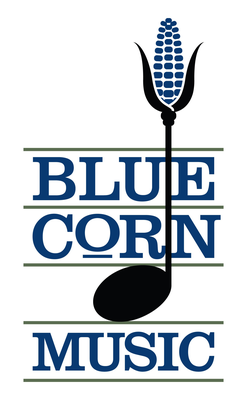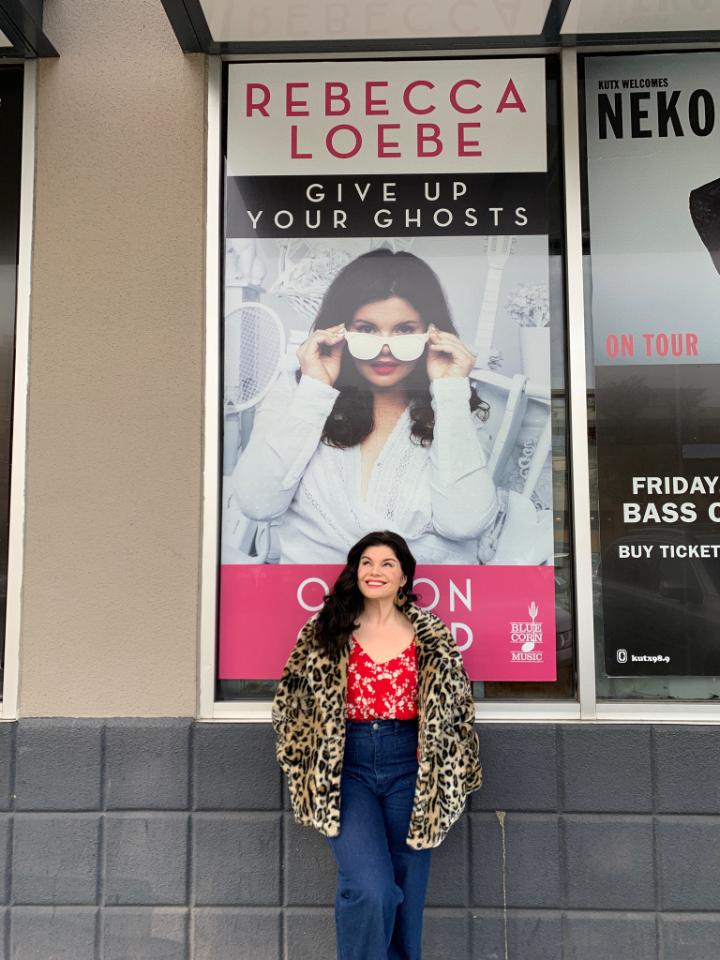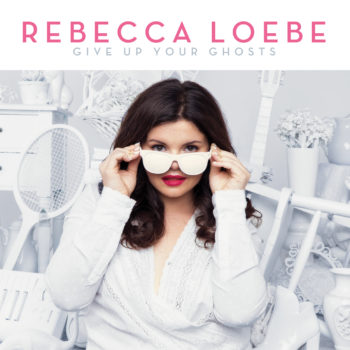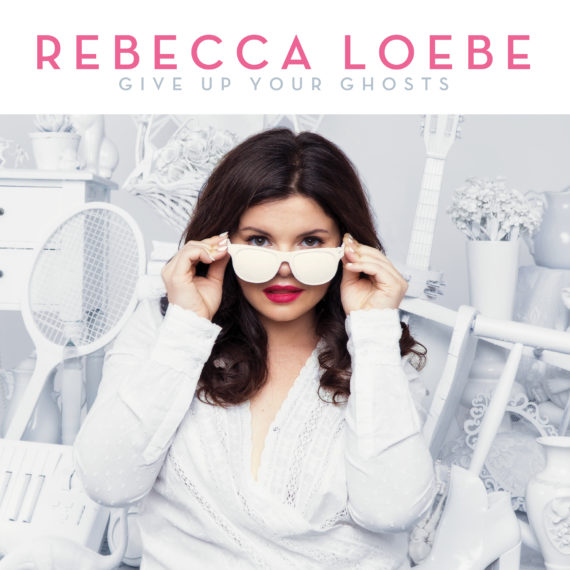Rebecca Loebe
- Ghosts
She calls herself a singer-songwriter, but as soon as Rebecca Loebe leans into the first notes of Give Up Your Ghosts, her first release for Blue Corn Music, that definition starts to seem woefully inadequate.
Loebe is not just another talent. She’s a talent — a sophisticated, mature writer with a relevant point of view and an assured, nuanced voice that’s both elegant and earthy, powerful and delicate, with a range and depth she hints at more than flashes. When the moment’s right, however, she’ll glide up a scale like Norah Jones, or drop right into a crag in Fiona Apple’s sidewalk.
But timing and delivery alone don’t make an artist. There’s got to be substance as well, and Loebe fearlessly probes the rawest corners of her psyche to find it. “There’s a lot of me talking to myself,” she says. “I’m writing a lot of empowerment jams these days, and I think it’s because it’s what I need. I’ve written albums full of what I needed to say, but this album is full of songs I need to hear.”
And now she’s on a guerrilla mission to share messages others need to hear as well. “I like to write catchy songs about topics that are meaningful to me, but use fun hooks to put words in people’s mouths,” Loebe admits. “My favorite thing is to get people singing along before they even realize they’re singing about women’s equality or their own self-worth.”
Inventively marrying elements of folk, pop, rock, blues and jazz, Loebe takes vocal left turns when you think she’ll go right, or shifts from breezy to profound in a single phrase. And each surprising twist makes her music that much more entrancing.
Blue Corn’s Denby Auble was so enthralled by her 2017 album, Blink, he immediately invited her to join his Houston-based label (home to three-time Grammy nominee Ruthie Foster). By then, she’d already cast her spell over Kerrville Folk Festival New Folk Competition judges, who made her a winner in 2009, and talent scouts for The Voice, who asked her to audition for the show’s debut season. (Her version of Nirvana’s “Come as You Are” charted worldwide and landed on the show’s first compilation album.) Two years later, Alternate Root magazine ranked her ninth on its list of America’s top female vocalists.
Turns out Loebe made the right choice when she decided she’d rather sing her own songs than work in a studio recording others’.
Born in Arlington, Virginia and raised in Atlanta, Georgia, Loebe was always musical. She picked up a guitar at 11 and honed her vocals in high school (where she also joined the wrestling team). After graduating at 16, she became the second-youngest member of her class at Berklee College of Music, and one of too few women studying audio engineering. But when a mentor encouraged her stay creative, she realized she wanted to sing the songs she’d secretly written for years. She took a job in a Boston studio, but snuck in after hours to record the demos that became her first album.
Returning to Atlanta so she could tour without paying Boston rents, she hooked up with studio owner and producer Will Robertson, who’d helped birth that album and a follow-up EP. Bartering studio work for recording time, she recorded 2010’s Mystery Prize, which spent 2½ months on the Americana Music Association’s airplay chart and made its yearend top 100.
Amid constant touring, Loebe spent so much time in Austin, she finally moved west in 2011. That year, she also released a B-sides-and-outtakes EP, and watched herself singing to 12 million viewers on The Voice. She spent the next two years opening for Ellis Paul on her first national tour, and performing in Europe and Japan. She also started inviting songwriter friends over for weekly potluck dinners. They shared dishes, then tunes.
“For my last couple of records, almost every song has gone through the filter of that group,” Loebe says. “It’s not just the feedback that’s important — in fact, that’s not as helpful as having to think critically about everyone else’s songs each week, for months on end, because it gets me thinking critically about what resonates with me; what expresses an idea most impactfully.”
When she was ready to record Give Up Your Ghosts, she called Robertson first. “We’re very comfortable together,” she says. “We trust each other and have a longstanding agreement not to shoot down ideas. We try each other’s suggestions and then communicate honestly about how they’re working.”
They returned to Austin’s ChurchHouse Studio, where she’d recorded Blink. “I just love that space,” Loebe says. “There’s something really vibey about it. It has a lot of cool old analog equipment. Everything works well, but not too well. It’s not pristine or clinical; it’s just a very warm and inviting space.”
She also used the same players, originally recruited to capitalize on existing musical relationships because she didn’t yet have a gig-tightened band.
“I thought I’d take a shortcut and get a rhythm section that had years of chemistry,” Loebe explains. She started with longtime friend Andrew Pressman on bass. He called his jamming buddy since fourth grade, drummer Robin MacMillan. Then came Christopher Cox, another Pressman pal, on keyboards; Raina Rose, Loebe’s neighbor, touring partner and bestie, on harmonies; and another longtime friend, guitarist and harmony singer Anthony DaCosta, now a rising star in Nashville.
Loebe says their bonds were critical, not only because they had fun, but because they wanted to do their best to support or impress one another. The only players added for Give Up Your Ghosts were pedal steel player Gary Newcomb and vocalist Heather Mae, who contributed more harmonies.
But despite that familiarity, making this album was quite different from her previous experiences, Loebe says.
“Typically, I’d spend years writing songs, then pull 10 or 12 that felt like they fit together,” she notes. “In this case, I just went through this writing spree and had all of these songs swell up inside me at once. They were written within a three- or four-month period — one organic moment in time.”
That’s partly why the album seems to have a loose theme. Several songs examine struggles to fit in or overcome painful chapters, as in the wistful “Tattoo,” originally written for a character on a TV show. The same exercise produced the sexy, dramatic “Got Away,” which really showcases Loebe’s vocal range.
“Growing Up,” the opening track, addresses the challenges women face, starting in childhood, in what is still a man’s world.
Loebe wrote it during a songwriting retreat, but it wasn’t shaping up the way she wanted, so she took a break — and wound up having the pop ballad “Ghosts” jump into her head almost whole, in one stream-of-consciousness thread. It starts with the striking line, Have you ever tried to fall asleep, twisted in a stranger’s sheets.
In the chorus, Loebe sings, Give up all your ghosts, at least the ones you love the most, they’re never holding you as close as you are holding them.
“This line is the mission statement of the record, and practically my whole life right now,” Loebe says. “I’m trying to encourage everyone to let go of what no longer serves us. To stand taller, walk lighter. We can’t outrun our pasts, but we get to decide who we are and what we will let define us.”
Visit the official Rebecca Loebe Website »
Tour Dates
No tour dates currently available.











